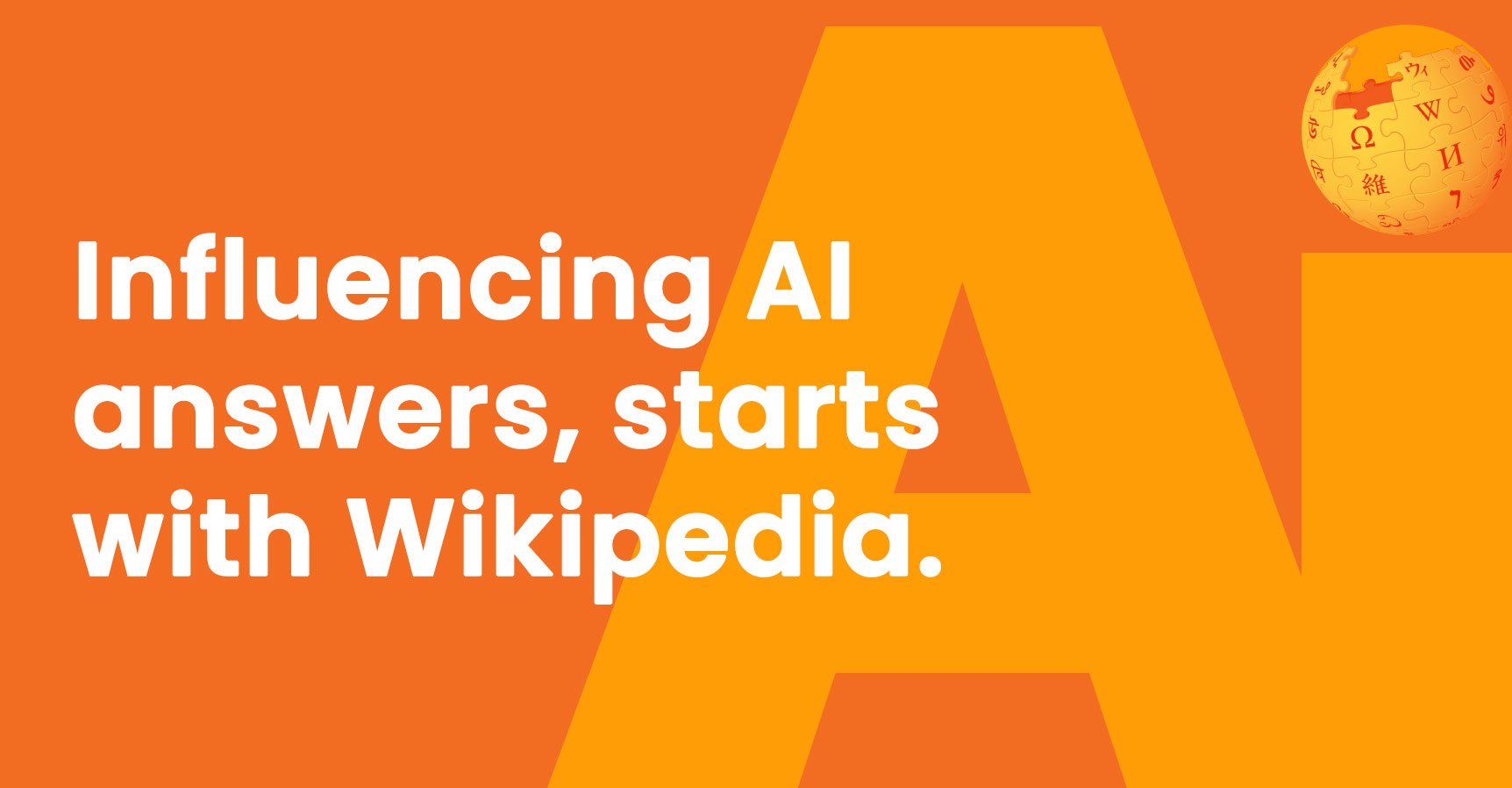AI Trains on Wikipedia. Your Business Should Too!

Want to Shape AI Answers?
Start with Wikipedia
This topic became important when we saw Wikipedia consistently outrank company websites and news articles in Revere’s AI brand monitoring tool.
Wikipedia wasn’t just shaping search results anymore—it was influencing how genAI described brands, products, and entire categories.
That’s when it hit me: if you want to influence how AI talks about your brand, Wikipedia isn’t optional.
Wikipedia gets nearly 7 billion visits a month making it one of the most-viewed sites on the internet.
It’s not just popular with people—it’s foundational to AI. Wikipedia plays a key role in search engine rankings and trains large language models like ChatGPT. OpenAI confirms it’s one of their core sources.
For B2B marketers, that means what’s on Wikipedia—or missing from it—directly shapes how your brand shows up in AI-generated answers.
In this guide, we break down what Wikipedia can (and can’t) do for your brand, how it works, why it matters more than ever and how to earn your place there.
How does Wikipedia Power AI Answers?
AI tools are hitting Wikipedia constantly, not just to train models, but to retrieve live information to answer user prompts.
In April 2025, Ars Technica reported a 50% spike in Wikimedia’s bandwidth, driven by nonstop AI queries.
So what’s shaping what AI says about your brand?
These bots—including ChatGPT, Perplexity, and Microsoft Copilot—use Wikipedia to generate real-time answers across search, chat, and voice. This isn’t just background training data, it’s live input.
If your company is accurately represented, AI assistants are more likely to surface it. If not, you risk being skipped or misrepresented.
Why Wikipedia Matters More Than Ever
Wikipedia is one of the core sources used to train models like ChatGPT, Claude, and Gemini. OpenAI confirms it’s part of their training data. That gives it major influence over what AI tools say—and what they ignore.—
Wikipedia pages aren’t written to promote your brand.
AI doesn’t need a mention on your page to find you.
But it often checks Wikipedia to judge whether other mentions are accurate and consistent.
Wikipedia drives high-intent traffic and visibility
- Wikipedia pages often rank high in branded search results—not from SEO, but from the site’s authority and structured format. For example, search “Oracle” and note where the Wikipedia page appears.
- They shape what shows up in Google Knowledge Panels and featured snippet.
- Visitors from Wikipedia tend to stay longer and engage more than the average website visitor.
The AI Impact: How Wikipedia Feeds the Machines
- It trained them. Most major language models were initially trained using Wikipedia’s structured, factual content.
- It informs them. Many AI tools pull from Wikipedia in real time to generate summaries or answer questions about people, companies, or concepts.
- It shapes perception. If your brand is covered, Wikipedia often becomes the starting point for how AI describes you—especially when fresher sources aren’t available.
Even if your website ranks first in search, Wikipedia may still be what AI models quote back to your customers.
AI Brand Responses Before vs. After Wikipedia
Just one well-sourced Wikipedia page dramatically improved how AI tools understood and presented this company.
| Prompt Asked by User | BEFORE A Wikpedia Page | AFTER A Wikipedia Page |
|---|---|---|
| “What does [Company] do?” | Generic or inaccurate summary | Accurate company description with product details |
| “Top [industry] platforms” | Not mentioned by name | Listed in 2 out of 3 AI tools |
| “When was [Company] founded?” | Incorrect date, wrong founder | Correct information sourced from Wikipedia |
| “Where is [Company] headquartered?” | Location missing or incorrect | Accurate location provided |
Want to Shape AI Answers? Here’s What It Takes to Earn a Wikipedia Page (it’s not easy)
First, your company has to meet these notability guidelines.
You’ve been covered in multiple independent, reliable, and in-depth sources — not just press releases, affiliate blogs, or company-owned media. Wikipedia’s Notability Guidelines
Those sources come from publications with real editorial oversight (think: business press, analyst reports, trade publications).
Coverage should show why your company matters — through innovation, market impact, or industry recognition.
If that kind of third-party coverage doesn’t exist yet, that’s where to start. Without it, your page won’t be accepted.
“Why doesn’t Wikipedia have a page about my company?”
Because Wikipedia isn’t a business directory. It only includes companies that are considered notable. In this article, Wikipedia discusses why every business isn’t listed in Wikipedia.
There is no guaranteed way to get your company listed at Wikipedia.
Even if you follow every guideline, your page may not be approved—or may later be flagged or removed.
These tips can improve your chances, but there are no guarantees. You might still see warning banners—like “Promotional Tone” or “Notability in Question”—at the top of your page.
Starting a new Wikipedia article about your company is hard—and being seen as biased can backfire. Microsoft once drew backlash for hiring a third-party writer to insert sponsored content.
If editors can spot a paid contributor, they’ll have no trouble connecting you to your company’s page.
How Can Your Company Earn a Wikipedia Page—The Right Way?
Earn a Reputation
Don’t start with your own company. Instead, make small, factual edits to unrelated topics. Show you’re a neutral, helpful contributor. The community notices. And if you build trust first, your company-related edits are more likely to stick.
Build the Right Coverage
If strong third-party coverage doesn’t already exist, stop here. You’ll need real articles — not press releases — from credible publications that explain why your company matters.
Engage Transparently
Create a free Wikipedia account and disclose your connection to the company. Don’t edit your own page directly. Use the Talk page to suggest changes. Keep it factual. Cite sources that are credible and publicly accessible.
Create Your Draft and Submit For Review
Use the Articles for Creation process to propose a new page. Volunteers will review it, edit it, and if it meets the standard, publish it. Expect revisions. Expect delays. That’s normal.
Don’t Force the Issue
Even if you do everything right, your page may not make it. Don’t argue. Use the Talk page. Ask what needs improvement. Stay calm, and adjust. Transparency earns respect. Pushing doesn’t.
Common Wikipedia Page Alerts
The best way to deal with these alerts is to engage the community through the Talk page.
 Weasel Words: Phrases like “some say” or “research shows” are too vague. Rewrite in concrete terms or cut them.
Weasel Words: Phrases like “some say” or “research shows” are too vague. Rewrite in concrete terms or cut them.
Final Thought: You can’t buy a Wikipedia page. You can’t optimize it like paid media. But you can earn it.
And once you do, you’re not just influencing search rankings — you’re anchoring your brand in the reference layer that powers how AI understands the world. That might be the most valuable visibility of all.
In 2025, Wikipedia backlinks remain valuable—not for traditional SEO, but for building entity trust, domain authority, and knowledge graph relevance.
Is Your Company Ready for Wikipedia?
Use this readiness checklist to evaluate whether your brand meets the basic Wikipedia eligibility standards:
- Has your company received detailed coverage in at least 3–5 independent, reliable publications (not just mentions)?
- Are your sources free of promotional tone and published by outlets unaffiliated with your brand?
- Do you have coverage that discusses your impact, products, leadership, or history in depth?
- Have you avoided using press releases, company blog posts, or your own website as sources?
- Can you summarize your company in a neutral, fact-based way without marketing language?
If you answered “no” to one or more, your company may not yet qualify for a Wikipedia page—but you can start building toward that goal with a focused notability plan.
What kind of third-party coverage does my company need to qualify for Wikipedia?
To qualify for a Wikipedia page, your company must be covered in multiple independent, reputable sources with editorial oversight—like business publications, analyst reports, or respected industry trade outlets.
These articles must explain why your company matters (e.g., innovation, market impact, awards) and cannot be press releases, affiliate blogs, or owned media.
Without this type of in-depth, third-party coverage, your company is unlikely to meet Wikipedia’s notability guidelines.
What If You’re Not Ready Yet?
Build Visibility Now
If your brand doesn’t yet meet Wikipedia’s notability standards, here are smart steps to start increasing visibility while you work toward eligibility:
- Secure coverage in third-party industry publications. Contribute thought leadership articles or provide expert quotes in relevant media outlets.
- Participate in analyst briefings that result in published reports (e.g., Gartner, Forrester, IDC).
- Submit for industry awards and track when those awards are written about by independent media.
- Speak at high-profile industry events that typically get press coverage.
- Get listed on Wikipedia pages about your category. If relevant, add your company to list articles (e.g., “List of digital banks”), using reliable sources to support inclusion.
- Optimize your Google Knowledge Panel and ensure consistent schema markup across your website and press room.
These activities help you generate the third-party sources Wikipedia requires—while also improving your AI and search visibility in the short term.
Will getting listed on Wikipedia improve my visibility in Google and AI-generated answers?
Yes. Wikipedia influences Google Knowledge Panels and feeds large language models like ChatGPT.
A strong, well-sourced page increases your brand’s presence in both search results and AI-generated content summaries.
What does Wikipedia consider “notable” enough for a company page?
Your company needs multiple articles in credible, independent media outlets—not just press releases or your own blog.
If the coverage isn’t there, you’re not ready for a Wikipedia page.
Can I write my company’s Wikipedia page myself?
Technically yes, but it’s risky. Self-written pages often get flagged or deleted.
A better approach is to disclose your connection and work with experienced editors or request edits transparently through the Talk page.
What if someone else already created a Wikipedia page for my company?
That happens. But don’t assume it’s accurate or complete.
Check the page for outdated information, missing sources, or a biased tone. If updates are needed, suggest changes on the Talk page and disclose your connection.
Wikipedia values transparency and may reject edits if you try to change things without declaring your interest.
How does Wikipedia shape what AI tools like ChatGPT or Perplexity say about my brand?
AI tools like ChatGPT, Perplexity, and Bing Copilot often pull directly from Wikipedia when answering user questions.
They treat Wikipedia as a reliable, structured source—especially when summarizing facts about companies, people, or industries.
If your brand is accurately represented on Wikipedia, AI tools are more likely to surface that information in real time. If your brand isn’t listed, or the content is outdated or incomplete, AI may skip over you—or get it wrong.
Rosemary Brisco
AI Training Videos
AI Consulting and Training
Master today’s most effective productivity tools.
ToTheWeb ensures your route to capitalizing on the immense power of AI is fast and efficient. Our AI consulting and training programs will quickly enable your marketing team to adopt solutions to optimize operations and boost performance.
Learn about our generative AI and ChatGPT consulting and training programs





